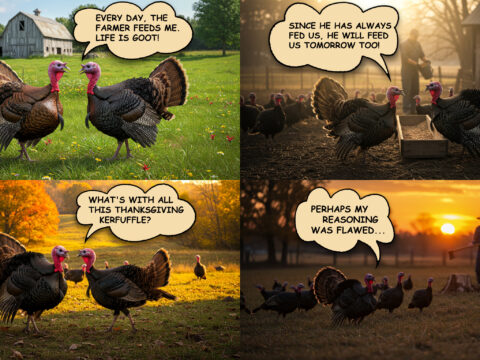
The idea that apparent regularity in the world does not necessarily justify the inductive principle—we can argue that the stability of certain natural patterns (e.g., the fact that people who die do not rise again) may be better explained by other frameworks rather than mere inductive reasoning.
Alternative Explanation: Divine Providence Over Induction
One alternative explanation is that the stability of natural laws, including the consistent fact that dead people do not rise again, is due to a rationally ordered universe governed by divine providence rather than inductive inference.
Inductive reasoning would argue:
- Every observed human being who has died has remained dead.
- Therefore, all human beings who die will always remain dead.
However, this reasoning is still based on the assumption that future cases must resemble past cases, which is precisely what is being questioned. Instead, one could argue that this pattern exists not because induction works, but because the universe is upheld by an orderly and rational structure.
Example: The Non-Resurrection of the Dead
Consider the fact that, throughout recorded history, we observe that when people die, they do not rise again. The inductive principle would say that because we have never observed a dead person returning to life by natural causes, we can assume this will always be the case in the future. However, this expectation does not arise from induction alone but rather from an assumed metaphysical order in the world.
Problems with Inductive Justification
- Inductive Generalization is not Absolute
- Just because we have always observed something does not prove it must always be the case.
- A materialist or naturalist might argue that “natural laws” prevent resurrection, but that explanation assumes a uniformity in nature that induction itself cannot justify.
- Just because we have always observed something does not prove it must always be the case.
- A Theistic Explanation for the Orderliness of Nature
- A Christian or theistic perspective would argue that the reason dead people stay dead is not because of induction but because God has established an ordered universe in which the normal course of events follows certain physical and biological principles.
- This perspective provides a reason why there is regularity, whereas induction simply assumes regularity without proving it.
- A Christian or theistic perspective would argue that the reason dead people stay dead is not because of induction but because God has established an ordered universe in which the normal course of events follows certain physical and biological principles.
- Miracles as an Exception to Induction
- The resurrection of Jesus Christ, if accepted as a historical event, is a direct contradiction to the principle of induction. If one were to reason inductively, one might argue that resurrection is impossible because it has never been observed in ordinary human experience.
- However, if God exists and governs the universe, He is not bound by the patterns of regularity we observe, meaning that a miracle is not an impossibility but a divine exception to ordinary occurrences.
- The resurrection of Jesus Christ, if accepted as a historical event, is a direct contradiction to the principle of induction. If one were to reason inductively, one might argue that resurrection is impossible because it has never been observed in ordinary human experience.
Why This Undermines Induction
- If the principle that “the dead do not rise” were truly an inductive conclusion, then the claim that Jesus rose from the dead would be automatically dismissed, not because of evidence, but because of an unjustified commitment to the assumption that past events must always predict future possibilities.
- However, if the order of the universe is upheld by divine decree, then there is a reason why the dead do not rise—because God has ordained it so. This also allows room for the possibility of divine intervention in rare cases, such as the resurrection of Christ.
Conclusion
The constancy of certain natural laws (such as death being irreversible) does not necessarily prove the validity of induction. Rather, it can be better explained by a metaphysical or theological framework in which the universe is governed by rational laws, either through natural necessity or divine will. Induction itself does not justify these regularities; it merely observes them and assumes they will continue, without a true rational foundation.
—ChatGPT AI



